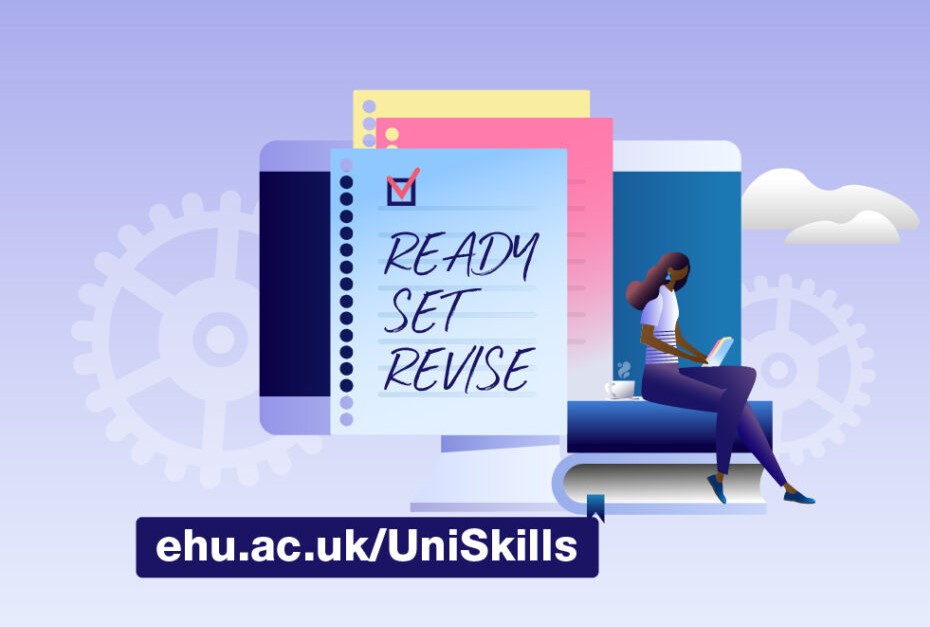We hope you have enjoyed all our Ready, Set, Revise activities so far. Preparing for exams and assessments can be stressful and one of the most important parts of exam preparation is revision. Revision is the process of reviewing and re-learning information that you have already covered during your studies. But don’t worry because your UniSkills Student Advisors have got you covered! They know exactly how you’re feeling so join them as they share their top tips on how to make the most out of your revision time.

Over the years I have sat in many exam halls in school and university. Reflecting upon them I did find them challenging as the questions can be unpredictable. Using past papers and attending revision sessions helps me to develop my knowledge in preparation for the exam, ensuring that I achieve the best possible outcome. The earlier I start with studying the better my understanding and the less pressure I feel walking into the exam hall.
I also ensure that the night before any exam I get a good night’s sleep and have everything ready to go so that I am not stressing before the exam.
Top tips from me are to start revising early using your time effectively to gather any information you don’t understand in advance of the exam.
Student Advisor Darren
Tip 1: Create Two Timetables
Timetable one details what exams and assessments have you have coming up. Include details such as what modules they are, time, date and what are you expected to do. Put these in a table to make it clear and stick it on your wall.
Timetable two outlines what you plan to do day by day. What exactly are you going to revise and tackle each day Break your revision down, plan every single day out and tick it off as you go through. Some days you won’t get it all done and that is ok. Small attainable goals are the key to getting through. Ensure to plan in regular breaks too – this is just as important!
Tip 2: How to know what to revise
Go back to your lectures and seminars as starting points. Look at any revision notes and materials published by your module leaders and tutors – have they given an indication of the topics and what have they asked you to do?
Read widely around the topic and piece together concise notes.
Look at past exam papers if possible.
Practice your exam technique.
Tip 3: Revision Methods – Discover your learning style!
Every student is different. Not one learns the exact same nor revises the exact same. Personally, I found doing mind maps on A3 paper for each topic helped me. I would include everything on that topic and lay it out in chronological order on the mind map of exactly how I would answer a legal essay or problem-based question in an exam – including the introduction and conclusion.
Use of coloured pens are essential for helping the information stick in. I kept reading the mind maps and then practicing writing it up under timed conditions. I would also get friends and family to test me. Other methods include flashcards, PowerPoint presentations, writing out notes repeatedly, study groups, sticky notes… do what is best for you.
Student Advisor Elizabeth
Revision is hard, time-consuming and nerve-racking but seeing it all pay off when you get your result back is the best feeling in the world.
My biggest tip may be obvious but take breaks!
A lot of people make the mistake of trying to cram knowledge into their noggin just before the exam and while that does work for a very select minority, for most of us, it leaves us unprepared. Give yourself plenty of time to make notes and take regular breaks throughout your revision days.
I like to take a 2-1 approach where I do two hours of revision and then take one hour to relax and do the things I enjoy doing in my downtime. This exact structure may not work for everyone so have a play around in plenty of time to find your limits and your own take on this approach.
Another tip is to go outside and get some fresh air. The outside world may be scary and be filled with…. ugh… people (the scariest of all the mammals) but even sitting in a garden or under a tree in a park while you revise is great for your mental and physical health.
I have already touched on it but also make sure you start in plenty of time. If you know you have an exam in one of your modules, make notes on each weeks lecture as you go along, otherwise when you end up trying to write 10 weeks worth of notes down all at once, it can be an overwhelming task.
Try to make just a few flash notes after each lecture and you’ll thank yourself in the long run.
Finally, don’t be afraid to use other forms of revision other than just reading a textbook or writing down notes.
I am a visual learner and find I can remember things more clearly if I see it in video form, look online for videos on the topic you’re writing about or better still, make your own videos of you reading out loud and talking about the content that’s going to be in your exam.
It might feel weird at first but if you have fun with it and edit the video with flashy transitions and over the top dance sequences (only joking… unless?) you’ll find this approach can be a great way to remember all that crucial information in time for your exam.
Student Advisor Sam
My revision tip is to find somebody you know and simply talk to them about your revision materials. Whether it be when you’re commuting, eating a meal, or taking a break, find somebody who is willing to listen. Tell them about the theory or concept you were revising that day, break it down to its key components, and explain simply and clearly. This may work better if the person you’re speaking with doesn’t have the same subject specialism as you, as you’ll have to be clear and concise with them, but finding somebody who does study your subject area has its own benefits, as they will be able to correct your mistakes, or even debate theory with you.
It sounds like I’ve simply recommended chatting to your friends as a revision strategy, but there’s two good reasons for this!
The first reason is because traditional revision can often be disheartening and antisocial – it has a tendency to reveal to me just how little I know rather than marking the progress I have made. Instead, the act of sharing what you know with somebody close to you celebrates what you know at this stage! Being in the position to share ideas and knowledge with another gives you a sense of agency in what can be a demoralising process, and each conversation serves as a milestone for the breadth and depth of knowledge you have internalised.
The second reason is a little more practical. Revisiting material you have revised by way of explaining it to another person will simply help you remember it better. This may come as a result of situational things. Perhaps the way you word a concept to your friend perfectly crystallises it for yourself. Perhaps the questions your friend asks forces you to think deeply and test your own understanding. The trials that come with the experience of playing teacher – even in just a casual setting – will test your knowledge and highlight potential weak points or gaps. Best of all, this is all done in a sociable, relaxed context, so it doesn’t even feel like revision at all!
Your exam materials may be the last thing you want to think about when you’re spending time with a friend or loved one, but recalling information to a peer, particularly one without your subject expertise, can make for a casual, sociable challenge and will serve as a hopefully encouraging litmus test for your progress
Student Advisor Eoin
This year I have not had any exams but I recall my exams from last required me to come up with strategies that did not involve hours and hours looking at a screen. For me, the key to successful exam revision is planning. It had been a very long time since I had taken a formal exam so I was a little anxious about the whole process. When you think about how much content is covered across 10 -12 weeks of a semester, how on earth are you supposed to remember it all? I will share my tips that I found helped me.
Tip 1 – A rainbow of revision notes
My first revision tip is to create notes in whatever digital format is most effective for you, then print those notes on different colour topics. So for each weekly lecture topic, I would use a different colour paper to print my notes on. I then stuck these notes around so I could see them throughout my day. This colour technique really helped me in the exam when I tried to recall facts. Remembering the colour was far easier than trying to remember all the content. I found that just that simple technique would then trick my brain into recalling the content. It worked really well and I achieve really good grades. I will use this again in future.
Tip 2 – Let the walking do the talking!
Revision can be mentally exhausting but even though you may not feel you have the energy to get out in the fresh air, a short walk will help your revision. I get worried that this is wasted time so I record myself summarising some of my revision notes. Then when I am on a walk I listen to the recording. I do not focus on the recording, more just have it on in the ‘background’ of my walk. I found this even more helpful to listen to my recordings as I walked to campus. It is amazing how much you can take in on a one-mile walk.
Tip 3 – Revision Reward Basket
When revising it is easy to get distracted by grazing on unhealthy snacks. To keep me as alert and properly fuelled I created revision baskets for myself for the week before exams. In the baskets (you could easily use any container you have) I added fruit, healthy snacks, and a bitesize chocolate bar (because we all know no one gets through revision without chocolate). This reduced the chance for me to keep going to the treat drawer when taking a break – my basket was there all ready for me to snack on.
Student Advisor Michelle
Quick Fire Revision Tips:
- Consult your past-papers and assignments for feedback and make notes on how you can improve, you could turn this into a to-do list
- Repetition is key, write it down, talk it out loud and read back over it
- Start big and condense it down- turn notes into mind maps and then mind maps into flashcards
- Don’t always spend a full day studying, make sure to take regular breaks if you do, perhaps try the pomodoro technique
- Teach someone your material and if you have no one around to teach act as though you are teaching yourself for the first time and create your revision materials as though they are for someone first learning about your topic
- Plan what to do with your time even if its just roughly, your schedule can be adapted as you go along so you can find out what works best for you
- Organisation doesn’t have to be perfect, keeping track of deadlines and exam dates on post it notes or even scrap paper is great as long as you remember to keep track of things
- Remember that flashcards are great but only if you keep reviewing them
- Mind maps are fantastic for linking concepts together
Student Advisor Rosie
- Make sure that you’re looking after yourself to avoid burn out otherwise you can’t get any work done!
We hope you’ve enjoyed reading all our Student Advisor revision tips and strategies. Keep an eye out for further blogs from our Student Advisors coming soon including time management mastery, soundtrack your studies and study breaks for every situation.
Good luck with your exams and assessments!






